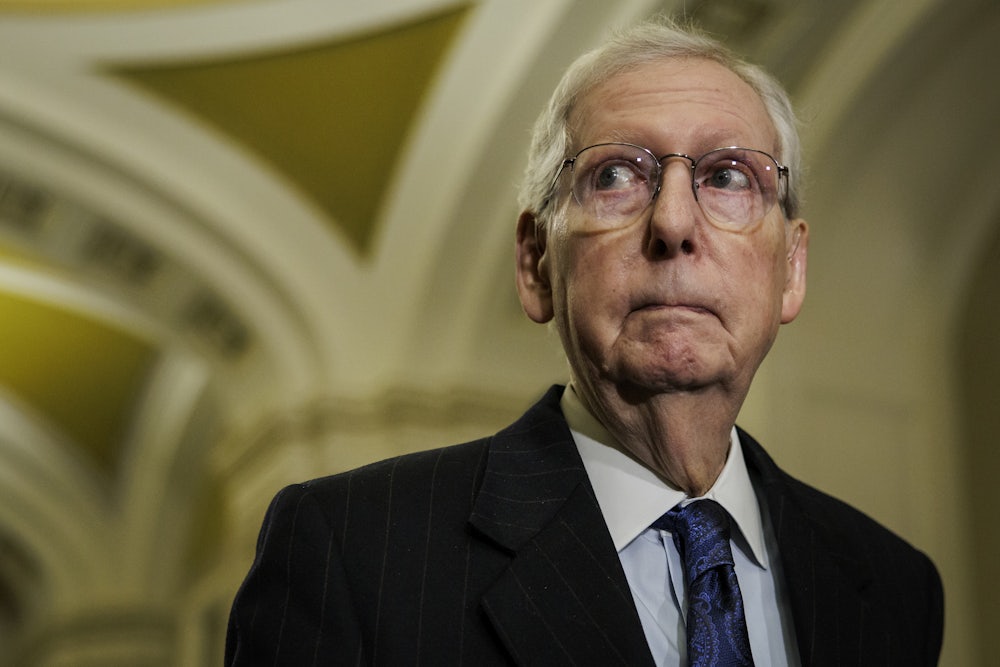In the Senate battle over Ukraine funding, one surprising issue has emerged that has led to a fascinating intra-Republican dispute—and one of the most aggressively anti-Ukraine Republicans is very vocally leading the “anti” side.
The issue is whether the United States and other Western countries should pay to prop up Ukraine’s entire economy, and specifically its social safety net and old-age pensions, or just replenish its critically diminished supply of munitions in its war with Russia. On December 11, Ukrainian President Volodymyr Zelenskiy traveled to Washington to make his case to Congress for $61 billion in emergency assistance the White House has requested for Ukraine.
“If there’s anyone inspired by unresolved issues on Capitol Hill, it’s just [Russian President Vladimir] Putin and his sick clique,” Zelenskiy said, only to fly home empty-handed because many MAGA Republicans in both chambers of Congress have soured on America’s Ukrainian ally—a position in lockstep with Donald Trump’s longtime geopolitical bromance with Russia’s leader-oligarch, Vladimir Putin.
Walking point in that platoon is Ohio Senator J.D. Vance, once an anti-Trump moderate who was reincarnated on the 2022 campaign trail as an ultra-MAGA scourge of liberals and university professors and elite educational institutions (he has a law degree from Yale). “Even if you support funding for Ukraine for some national defense purpose, which obviously I do not, I think it suggests that they’re effectively becoming a welfare client if we’re funding their pensioners,” said Vance, who is considered a possible vice presidential pick for Trump.
In December, Ukraine’s minister for social policy, Oksana Zholnovych, said that 500,000 civil servants, 1.4 million teachers, and 10 million pensioners could experience payment delays if foreign humanitarian assistance is not approved soon.
Vance and other MAGA senators have since gone out of their way to throw cold water on Biden’s funding package for Ukraine, which has been tied down in the Senate with unrelated immigration policy concessions Senate leaders in both parties have demanded to push a deal through.
On Wednesday evening, Senate Minority Leader Mitch McConnell convened a nearly two-hour-long meeting for Republican senators to air their grievances over the migrant policy and Ukraine aid package. “We are in a quandary,” McConnell reportedly told his Senate GOP conference during the meeting, because Trump opposes any bipartisan effort on immigration policy in Congress, preferring to use migrants as a campaign issue. “The politics of this have changed,” he added—a pathetic kowtow to his party’s front-runner, who opposes a border deal so he can use the issue against Biden.
Senate Republicans spent Thursday denying reports that McConnell had given up on the yet-unrevealed migrant policy piece of the Ukraine aid package, while offering a range of opinions about what the latter should look like or whether it should be advanced at all.
Senator Josh Hawley, a Missouri Republican and Trump ally, said he will likely oppose Ukraine aid, expressing doubts that the Pentagon could account for the military expenses being proposed by Biden, while citing a GAO report last month that found the Defense Department cannot account for 63 percent of its $4 trillion in spending in 2023.
“We’ve got to ask our NATO allies in Europe to take the lead on the defense of Europe,” said Hawley, a criticism of the North Atlantic Treaty Organization that goes back over a decade when President Barack Obama complained of the unequal “burden sharing” among the allied nations.
According to the 2006 treaty, NATO nations must spend 2 percent of their gross domestic product on defense. The U.S. currently spends 3.5 percent of GDP on defense, while Canada spends just 1.2 percent. “That’s bullshit,” said Senator Dan Sullivan, an Alaska Republican, expressing frustrations with Canadian Prime Minister Justin Trudeau. “You got all these laggards … these Europeans, Canadians, they gotta step up.”
Sullivan told The New Republic that he supports sending military aid to Ukraine, “but budget support, even economic aid … that can come from rich European countries.” Senator Rand Paul disagrees. “I’m not for sending any more money to Ukraine,” said the Kentucky Republican on Wednesday.
“I think it’s insulting that we’re paying for their pensioners and government workers. We’re paying for small-business loans and grants in Ukraine. I think it’s crazy. We actually have to borrow the money to send it to them,” he added, a point echoed by Senator Rick Scott, a Florida Republican and fellow faux budget hawk in Congress. Paul, like Scott and most of their GOP colleagues, voted for the 2017 Trump tax cuts for wealthy Americans that have added billions to the federal deficit.
Senator Ron Johnson, a Wisconsin Republican and Trump ally, threw another wrench into the Ukraine funding effort on Thursday by demanding that the package be paid for through cuts to Biden’s green energy initiatives, a nonstarter according to a source in Senate Democratic leadership.
Meanwhile, GOP senators who support fully funding Biden’s Ukraine request increasingly find their voices drowned out in what has largely been a closed-door debate about foreign aid. “We can’t have people starving, or they won’t be able to maintain their operations,” Senator Mitt Romney, a retiring Utah Republican and former GOP nominee for president, said on Wednesday morning when asked about funding the Ukrainian social safety net.
Across the political aisle, Senate Democrats have been in lockstep behind Majority Leader Chuck Schumer, in support of fully funding Ukraine. “You can’t fight a war if you’re not able to feed the families of the soldiers and educate their kids back home,” said Connecticut’s Chris Murphy, adding: “So there’s no way to support Ukraine without helping the country’s economy and social service infrastructure stay afloat.”
For his part, McConnell knows the world is watching. An aide to the minority leader tells The New Republic that the 81-year-old sees funding Ukraine’s fight against Putin, America’s geopolitical nemesis, as a legacy item. What remains unclear is whether McConnell can deliver the votes needed from his own Republican senators around what he has clearly stated for months to be his top priority in the Senate. McConnell has been known throughout his career for his iron grip on his caucus. We’ll find out soon whether he still has it.






